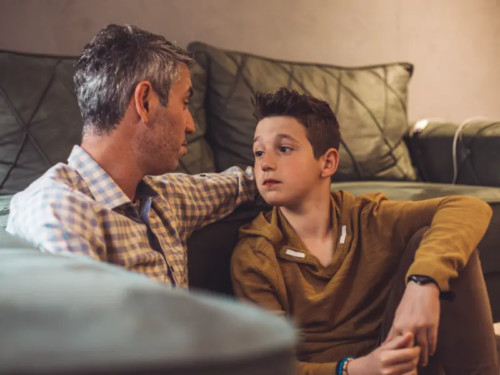
Table of Contents
Long Term Effects of Sexual Assault

Written By: Dr. Rasna Kaur Neelam

Clinically Reviewed By: Dr. Don Gasparini
April 2, 2023
9 min.
Being a survivor of sexual assault is, unfortunately, a common experience that can have long-term implications on your physical and mental health. In this article, we discuss some of these hidden impacts and propose solutions.
Learn more about our Clinical Review Process
Table of Contents
Every 68 seconds, an American is sexually assaulted. Sexual violence affects hundreds of thousands of Americans every year.
The long-term effects of sexual assault are often insidious, may be hard to notice, or are often “hidden.” In this article, we will discuss how sexual assault can cause long-term impacts on survivors in the following ways:
- Physical health
- Brain structure
- Mental health
- Ability to develop sexual relationships
- And more
Please note that not every survivor of sexual assault will experience these changes, and there may be impacts of sexual violence that a survivor has experienced that are not listed here.

Personalized mental health treatment for survivors
Fill out our form or call our team to get started with our virtual program today
Long term effects of sexual assault on physical health
Trauma is the response that your body has to a disturbing event such as a car accident, natural disaster, war, assault, or more. Unfortunately, the trauma of sexual assault can often lead to long-term changes in one’s physical health. Research studies show that individuals with a history of sexual assault rate their own health as poorer, and doctors in these studies agreed with this assessment.
General symptoms or signs of trauma include:
- Nausea
- Headaches
- Fatigue
- Difficulty with sleeping
- Feeling jumpy or more prone to being easily startled
- Difficulty with concentrating
Additionally, certain diseases or health conditions have been associated with a history of sexual assault in research studies. These conditions include:
- Chronic pelvic pain without a clear physical cause
- Menstrual disturbances such as pain with menstruation, irregular menstrual cycles, or excessive menstrual bleeding
- Multiple yeast infections
- Pelvic inflammatory disease: an infection of the reproductive organs caused by sexually transmitted infections
- Fibromyalgia: a pain syndrome where individuals feel pain and tenderness at different points in the body with no clear cause
- Gastrointestinal disorders, or issues related to the stomach and intestines
- Headache disorders
Health concerns may cause individuals to stay at home or may limit their mobility or activity. Further research needs to be completed to better understand what additional health conditions are related to sexual assault.
If you are a survivor of sexual assault, it is important to be well-connected to a physician that you trust and who understands and respects your boundaries. Certain types of physicians may be helpful – including a primary care physician as well as doctors who specialize in obstetrics and gynecology, urology, or gastroenterology. Furthermore, physical therapists who specialize in pelvic floor therapy can help to relax muscles that may be tense from a heightened trauma response.
What is sexual assault?
First, let’s define sexual assault, rape, and consent.
Sexual assault is a term that refers to any sexual act, contact, or behavior that occurs without the explicit consent of the victim. Examples of sexual assault include rape or attempted rape, forcing a victim to perform sexual acts that they do not wish to perform, unwanted sexual touching, and more.
Rape is a type of sexual assault that is often used as a legal definition. It refers specifically to sexual penetration without consent. Each state may define rape in a different way, and you can learn more about how your state defines rape here.
Finally, consent is an agreement that two individuals make to participate in sexual activity. Consent is about enthusiastic communication (either verbal or non-verbal) and should be obtained every time you engage in any sexual acts. Enthusiastic consent means you are looking for the other individual to say “yes” with their words or actions rather than looking for the absence of a “no.”
An individual is only able to consent if they are age-appropriate, are sober (not intoxicated) and are conscious, do not have a developmental disability that prevents them from providing consent and are not in a vulnerable situation (for example, someone who relies on the perpetrator).
Unfortunately, sexual assault is extremely prevalent. A few eye-opening statistics related to children and teens include the following:
- Every 9 minutes, Child Protective Services substantiates or finds evidence for a claim of child sexual abuse
- One in 9 girls and 1 in 53 boys under the age of 18 experience sexual abuse or assault at the hands of an adult
- 82% of victims under 18 are female
- Victims of child sexual abuse are more likely to develop symptoms of drug abuse, PTSD, and depression
Do you need more support with
your mental health?
Charlie Health can help.
How sexual assault changes the brain
In addition to the body, the traumatic event of sexual assault can be seen in the brain. In fact, research studies have shown that trauma can impact the following brain structures.
The amygdala
The amygdala is named for its resemblance to the shape of an almond. It is one component of the limbic system which is responsible for the control of emotions. Trauma can cause the amygdala to become hyperactive, meaning it is activated more easily. For this reason, people who have experienced sexual assault may be on edge, easily started, or hypervigilant.
The hippocampus
The hippocampus is embedded deep in the brain and plays an important role in learning and memory. Unfortunately, the trauma of sexual assault can result in a smaller hippocampus, especially if the assault occurred in childhood while an individual’s brain was still developing.
The prefrontal cortex
The prefrontal cortex covers the front of the brain. It is involved in decision-making, planning, memory, personality, social behavior, speech, language, and more. Once again, trauma may impact the job of the prefrontal cortex, and further research is needed to fully understand its consequences.
If you feel that you are having trouble with your emotions or memory, speaking with a trained counselor, a psychiatrist, or a neurologist may help. Once again, connecting with a clinician who you trust and who understands and can empathize with your history is important.

Changes to sexuality and relationships
Individuals who have experienced sexual assault may have disturbances in relationships after the assault. This may include withdrawing from loved ones or refraining from sexual activity due to feeling embarrassment, shame, or guilt about what happened.
In children, the opposite may hold true. Children who are assaulted may show increased sexual activity or sexuality for their age, and this is often a clue that something out of the ordinary has occurred. In cases where a child is acting in a sexual manner appropriate for their age, action should be taken to understand why this is the case.
For adults, connecting with a trained counselor with a focus on relationships, sexual or otherwise, after an assault has occurred may be a good first initial step into understanding and unpacking how a history of sexual assault is impacting your current life. A survivor’s partner may also wish to join sessions to better understand how they can best be of support. For children or teens, counselors with a focus on child sexual abuse can help children understand their emotions in a variety of ways, including family therapy, art or music therapy, and more.
Sexual assault’s long term effects on mental health
Individuals with a history of sexual assault are more likely to experience a wide variety of mental health disorders or unhealthy coping behaviors. If you are a survivor of sexual assault, reading the below descriptions may alert you to areas for which you could use support.
Depression
Unipolar depression, meaning depression that you may experience by itself without periods of mania, often presents with the following symptoms:
- Persistent feelings of sadness or hopelessness
- Loss of interest in activities that once brought you pleasure
- Significant changes in your appetite, such as eating too little or too much
- Sleep disturbances like sleeping too little and waking up early or sleeping too much
- Feeling slow
- Loss of energy or fatigue
- Feelings of worthlessness or guilt
- Difficulty concentrating
- Recurrent thoughts of death or suicidal thoughts
If you have many of the above symptoms most days for at least 2 weeks, you may be diagnosed by a clinician as having an episode of depression. Therapy and medication, when prescribed by a professional, have been proven to be effective treatment options.
Anxiety
We all have moments where we experience worry, fear, or stress from time to time. But for individuals who have an anxiety disorder, these feelings are always “on,” leaving you feeling like you are permanently on high alert. This is something that can develop after a sexual assault. Signs of anxiety may include:
- Feeling restless
- Feeling on edge
- Struggling to concentrate
- Feeling tired all the time
- Getting sick frequently
- Having general aches and pain without a specific known cause or trigger
- Having difficulty controlling your emotions
- Feeling overwhelmed
There are many different types of anxiety. Panic disorder is a type of anxiety disorder, for example, in which individuals get panic attacks and then worry about getting another one. Just as with depression stated above, therapy in combination with medication has been shown scientifically to be an effective treatment for someone with anxiety.
Post-traumatic stress disorder (PTSD)
A large percentage of sexual assault victims will develop a condition called post-traumatic stress disorder, something that is formally diagnosed by a clinician. This is a disorder that can happen to anyone who has experienced a shocking, scary, or dangerous traumatic experience such as sexual assault, sexual abuse, or any other type of sexual trauma. Symptoms of PTSD often fall into the below four categories:
- Intrusive thoughts
- Avoidance
- Changes in mood and thinking
- Changes in arousal
Substance abuse
Sexual abuse survivors often turn to substance abuse to help cope with negative feelings, distract themselves, and numb painful thoughts.
There are many types of therapy specifically designed to help individuals with PTSD. Some of their names are trauma-focused cognitive behavioral therapy, eye movement desensitization reprocessing therapy, and exposure therapy. In addition, medication can sometimes be helpful when recommended by a doctor who specializes in mental health.
Eating disorders
“Disordered eating” is an umbrella term used to describe conditions in which an individual feels uncomfortable about their body, how much they eat, how much they exercise, and more. When disordered eating becomes severe, it can lead to an eating disorder, and this sometimes is seen in individuals with sexual assault. Examples of eating disorders include anorexia nervosa, binge-eating disorder, bulimia nervosa, avoidant restrictive food intake disorder, and more. The specific relationship between eating disorders and sexual assault isn’t entirely known, but an emphasis on control and discomfort with one’s body may be part of the cause.
Psychotherapy, medication, discussion with a doctor, and sometimes even hospitalization are required to help treat these conditions.
Self-harm and thoughts of suicide
Examples of self-harm include cutting oneself, pulling out hair, picking at wounds, or causing more serious injuries to oneself. Sometimes, but not always, self-harm actions can be warning signs that an individual is thinking about suicide. Individuals who have experienced assault are at an increased risk of self-harm and thoughts of suicide.
If you are thinking about seriously injuring yourself or ending your life, call 988 or use the lifeline chat to text message someone online.
Get help today
If you or someone you know has experienced sexual assault and would like to immediately contact a trained staff member from a sexual assault service in your area, contact 1-800-656-HOPE(4673).
Helping you feel healthy both mentally and physically is our goal at Charlie Health. We understand that this often requires time as well as the coordination and support of therapists, doctors, family members, friends, partners, and – at times – social workers, case workers, lawyers, or law enforcement.
At Charlie Health, we have trained clinicians who specialize in coping with the long-term mental health impacts of sexual assault and trauma.
We’re available 24/7 to get you started on your healing journey.





